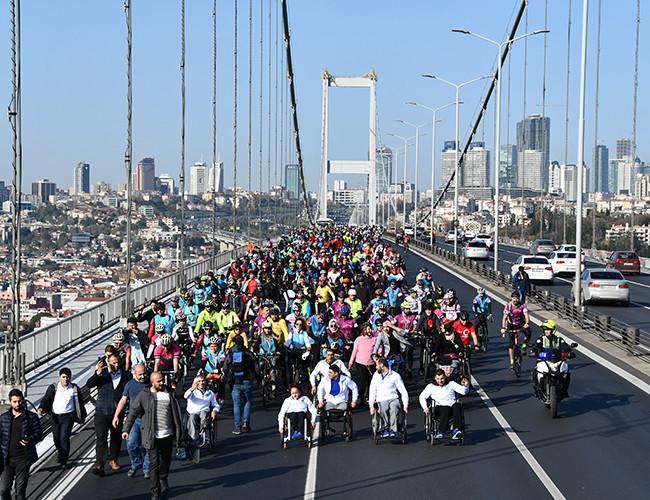Turkey marks Int’l Day of Disabled Persons amid limited opportunities
Esra Ülkar – ISTANBUL

In recent years, Turkey has taken important legal steps in regards to equality, accessibility, and employment opportunities for the disabled community, but due to a lack of change in mentality, the difficulties disabled people face show the country still has a long way to go in terms of providing opportunities for their meaningful participation in public life.
The International Day of Disabled Persons was marked on Dec. 3 amid complaints over limited opportunities. The country’s disabled community comprises about 6.6 percent of the population, with almost five million people according to the most recent population and housing census.
The community only asks that basic rights be granted to them, such as access to a home, education, healthcare, transportation, leisure and employment along with a more inclusive society, which they believe can be accomplished with the successful implementation of disability laws. One of the most serious problems disabled people face is discrimination in the education system.
The mother of 19-year-old Özge Çeltik, who was diagnosed with autism at the age of two, talked about the type of discrimination her daughter faced throughout her school years, especially in regards to attitudes from other parents towards the issue.
“We have gone through many problems. We have probably applied to about 50-60 schools when Özge was little. There were also schools from which we were kicked out by parent signatures that were collected after our registration. There were others in which the teachers told me, ‘Come and get your child.’ They do not want such a child in their classes. There are also parents who think autism is contagious. They do not want to see it, they turn their heads the other way,” Özge’s mother Suna Ağı told daily Hürriyet.
After completing high school, Özge wanted to continue her education in opera studies at university, but since a relevant aptitude exam was not offered “in line with her disability,” Özge could not pass the exam, her mother said.
Ağı then sued the university and is currently waiting for the investigation to be concluded.
“Even if I win [the lawsuit] after this, [university] classes have already started. My child’s [education] this year is over. YÖK [the higher education council] has taken the right decisions. They have pulled the minimum score threshold for the university entrance exam down to 100 for the disabled, but there also needs to be a change in university exam regulations. YÖK needs to undertake a general legislative arrangement without leaving the issue up to schools and universities,” Ağı said.
Rüzgar Özçetin, an 11 year-old diagnosed with Asperger’s, previously attended a public school. While attending second grade, his teacher “hit the nape of his neck” and accused him of “stupidity,” his mother Banu Boralı said.
“Since his friends saw the teacher as a role model, they perceived him that way. Then, he attended a private school and we did not have any problems there,” Boralı said.
Meanwhile, a group of people including people with disabilities, joined a bicycle cortege taking off from Istanbul’s Mecidiyeköy district all the way to the Asian side on the July 15 Martyrs’ Bridge on Dec. 3. The event was organized as part of the Eighth International Barriers Film Festival undertaken by the city’s Bağcılar municipality.
When the cortege came to the bridge, the lanes were closed off for a brief period of time. The event’s participants stopped there to share their message of “A world without barriers” with the press.
Bağcılar Mayor Lokman Çağrıcılar, who was among the cyclists, told the press he was very happy to be a part of the event, advising disabled people not to “confine themselves in their houses” and “to be a part of society.”
“Our disabled brothers and sisters achieve great things in every field of life including, sports, art, literature and education, setting examples for society. We are proud of the success achieved by these people by overcoming difficulties,” said President Recep Tayyip Erdoğan on Dec. 2, to mark the International Day of Disabled Persons.
He stressed that he attached great importance to making the lives of disabled people easier.
“We see our disabled citizens as an inseparable part of our society and have taken essential steps within the last 15 years towards solutions for their problems,” Erdoğan said, adding that his government continues to lift obstacles to their education by re-arranging schools, cities and streets.
“It is our duty to encourage our disabled brothers and sisters, to give them a helping hand when they need it… to support them for a solution to their problems and be with them every step of the way to ease their lives,” he said.
Prime Minister Binali Yıldırım also issued a message saying it was the most natural right of all people, disabled or not, to assume an honorable, effective and equal role in society.
The United Nations General Assembly proclaimed Dec. 3 as the International Day of Disabled Persons in 1992.
















